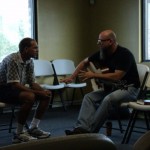Teaching and Positional Authority among the Church
My last few posts about teaching – and especially teaching when the church gathers – flies in the face of common church tradition and practice. In the normal view, teaching is tied to authority which is tied to position. If you have the right position, then you teach with authority.
Of course, this leads to huge problems. The primary problem – at least from my perspective – is that teaching from a position of authority is not really teaching as we find it in Scripture. Instead, in Scripture, teaching is from a position of service as we share our lives together.
There is another problem though. You see, if we focus on teaching and authority associated with position, then what happens when someone comes along with a “higher” position.
Skye recognizes this problem in his post “The Platform Principle.” He writes:
This radio show had more authority in Stacy’s life than I did. What authority I possessed had been built through years of sound teaching and the vetting of denominational leaders. But it was no match for the authority granted by Stacy to a speaker she heard on the radio.
In marketing lingo it’s called platform. The logic is simple—the magnitude of your platform determines the scope of your authority. Someone with an audience of one million has more authority than someone with an audience of one hundred. The assumption: the larger platform is a result of the person’s competency, intelligence, or character. That, of course, is not always the case.
Today authority is granted to those who have simply proven they can build a platform.
From the quote (and from the remainder of the article), the author is concerned that someone who should be under his authority (because of his position) has decided to rely on another person’s authority based on their position (as demonstrated by their larger platform). In fact, the author’s practice of teaching from his own position of authority leads his audience to understand that authority and teaching come from positions… and, of course, the bigger the position (such as a radio personality with a huge audience) the bigger the authority.
But, what if our ability to impact another person’s life was not based on our position at all? What if our ability to teach someone else resulted from our shared life experiences – the good, the bad, and the ugly – and demonstrated ability to live the truths of God – not our ability to speak the truths of God?
I think things would be quite different… for everyone involved… even the “teacher.”
What if you just have no time to spend with other people?
My friend Eric at “A Pilgrim’s Progress” is in an interesting situation. He’s written about it before, but he explains more in his post “No Time for Organic Church.”
You see, Eric quit his job as a full-time, vocational pastor for a local church organization several months ago. He prayed for employment for a long time (at least, a long time being unemployed), and God provided a job. However, he has to work long hours at this job – often working many overtime hours each week.
As he explains:
Because of this, our Sunday gatherings are extremely special to me. This is about the only time I get to see my friends. This is not by choice. It is a consequence of schedule. When we get together on Sundays, I find the time to be a wonderful, refreshing time of fellowship. I wish this could happen throughout the week, but right now that is not a possibility…
You may be in some sort of life situation that is keeping you from what you hope for as far as church is concerned. I want to encourage you. God’s grace is immense. He knows our hearts. He will also provide for fellowship in ways we don’t often expect or understand. However, as I’m learning, God’s timing is often far different from ours.
Someone could understand my posts last week about “organic church life” as a condemnation or admonishment of Eric and his situation. They are not intended that way at all.
Eric desires to share his life with others, but, in his wisdom, God has not provided that time. As Eric says, this is a time to trust God and rely on his grace.
My posts are meant as an encouragement to those of us who have time, but choose to spend that time on ourselves instead of sharing our lives with others.
So, if you find yourself in Eric’s situation… trust God and be patient. He knows what you need and when you need it… even if you think you need it now. 🙂
By the way, what do you think other brothers and sisters can do to help Eric during this time?
What hinders the church in the West?
Roger at “SimpleChurch Journal” recently asked a question and, in a post called “Organizing Your Thoughts on What Hinders the Western Church,” reports on the fascinating responses that he received.
Two weeks ago, Roger asked his readers to “help in identifying the key hindrances in the Western church.” Somehow, I missed his post, but I did not miss his current post, in which he summarizes the responses that he received.
This is what he reports:
Key Hindrances:
1. Our relationship with God
- Lack of intimacy with God
- Not listening
- We don’t know Him as He is
- We don’t know His word and/or we are lackadaisical about it
2. Our involvement in religious traditions and legalism
- Religious attitudes
- Man-made traditions
- Religion and pride
- Comfort-seeking in our church life
- Me-centered in our church life
- Consumer mentality as a Christian
3. Our followership (our walk as disciples)
- Lack of obedience to Jesus alone
- Lack of obedience to all of Jesus’ commands
- Not making disciples
- Not surrendered wholly
- No passion for the lost
- Compromise
Interestingly, while Roger writes about “simple church,” I do not think the things listed are limited to either simple (or non-simple) church structures and organization.
What do you think? Are these the “key hindrances”? Have you recognized these hindrances in your own life or in the life of the Christians around you?
People want real examples of organic church life
A few months ago, I was reading a blog post from someone on the “cutting edge” of the organic church movement – if it’s a movement. The person asked what his readers would like him to write about, and I said, “Right about real life example of what it means to be part of an ‘organic church’ and how it affects things like gathering together, discipleship, giving, evangelism, teaching, etc.” (paraphrase)
Earlier this week, Dan at “Cerulean Sanctum” asked “Is Organic House Church a Myth?” Why would Dan ask that question? Because he sees so few real life examples in his city. He has been reading through some of Frank Viola’s book, and he loves the descriptions that he finds there. But, why can’t he find them in real life?
Dan writes:
I say this because the more I attempt to locate the type of organic/house church that Viola says has been blessing his life for the last few decades, the more it seems like the fabled destination of another famous musical, Brigadoon…
I live just outside a metropolitan area of 2.2 million people that is heavily churched. When Christian pollsters and church resource magazines publish info about influential institutional churches, this area contains a disproportionately large number of them. Which is why I continue to scratch my head at the utter lack in such an area of anything resembling Viola’s ethereal organic church. Hasn’t anyone burned out of those institutional megachurches and fled to the supposed refuge of an organic church?
Reading the testimonials of organic church members included in Viola’s books makes my heart ache. But like so many tales one hears in the American Church today, it seems like those beautiful stories are happening in some hazy, distant place, almost like Narnia, except even harder to find.
I understand much of Dan’s frustration, and many of my readers have shared the same frustrations and difficulties in finding the kind of shared life in Christ that “organic church” books describe.
Now, I know that the type of shared life that Viola (and others) describe exist, because I experience it every day. I also know that this kind of church life can be found among the members of more traditional or institutional churches. However, that doesn’t help others who are seeking fellowship with others in this way. It still seems elusive.
As you can probably tell from my previous paragraph, I’m not interested in some new model of church that is labeled “organic church” as opposed to some other brand or model of church. Instead, I’m interested in brothers and sisters in Christ sharing their lives together in Jesus Christ in such a way that he is able to work through them as he desires – often unorchestrated, unplanned, unrehearsed, and unscripted.
Unfortunately, this kind of life cannot happen (only) in a church gathering… even an “organic church” gathering with open participation. This kind of life happens day in and day out when people spend time together, care about one another, give and help one another, and serve others together.
To be honest, I’ve found this kind of “church” more difficult to locate than “organic church.” There are several websites that list local “organic churches” or “house churches” in your area. However, tacking the label “organic church” or “house church” onto a group – or even meeting in a house or having an open participatory meeting – does not indicate that the people involved actually share their lives with one another.
However, these groups do exist. I’ve communicated with many people who live like this day in and day out with other Christians. I’ve even had a few opportunities to get together with representatives of different groups who gather around our area.
But… I still agree with Dan. This type of church life is difficult to find, and extremely elusive – even where it does exist.
Why do you think it is so difficult to find “organic church life”?
(By the way, I will offer some of my own answers to that question in tomorrow morning’s blog post.)
Do we want community? Really?
Arthur at “The Voice of One Crying Out in Suburbia” raises some great questions about community in Christ in his post “Book Review: Why We Live In Community.”
The post begins as a review of an e-book by Eberhard Arnold called Why We Live In Community. But, reading the book and thinking about the topic leads Arthur to ask some very important questions.
For example, consider this part of his post:
Most importantly, why don’t we live in community? Could it be that we love our autonomy, our freedom, our wealth and possessions more than each other? Is the idea of that sort of closeness and openness in this life scary to people who affirm in theory that sort of relationship in eternity? Perhaps most troubling, could it be that we fear living community in whatever shape it takes because we don’t really believe what we read in the Bible, just as we don’t seem to believe so much of what Jesus taught or how He lived or what He commanded? Is it just easier to live lives of religious observance and to find ways to nitpick and divide from one another so that we can justify our disunity? These are troubling questions but they are hammering me.
I agree with Arthur: these are troubling questions. I’ve wrestled with many of these questions, and continue to do so from time to time.
Why do you do when you find that you really don’t want to live in community in Christ with others?
When every part of the body of Christ functions together
Josh at “Called to Rebuild” has written another excellent post. This one is called “Missing the church.”
He begins by explaining that many close friends have been transitioning out of his life lately. Josh feels the loss… and that along is an amazing thought. In a time when “church” has become just another activity, it is a real family for Josh.
Next, he describes a time when God began to show him what could happen when the whole body of Christ worked together. He writes:
Anyway, as I sat there listening something just came over me. Tears welled up in my eyes. Nothing being said was at all specific to my trial at the time, but that didn’t matter. In a way I can’t adequately explain with words, I saw Christ being revealed as I listened to the brothers and sisters sharing. It was powerful. All the pressure from the burden in my heart was like a great big logjam, but as I beheld Christ through the functioning of His Body it was like a mighty river came bursting through the channels of my heart, forcing it all to the surface and clearing it away.
Josh refers to 1 Corinthians 14:24-25. While Paul writes about an unbeliever recognizing the presence of God among the church because everyone is prophesying, I can see how it would apply to Josh’s situation too.
As I read Josh’s post, I love this statement: “[A]s I beheld Christ through the functioning of His Body it was like a mighty river came bursting through the channels of my heart, forcing it all to the surface and clearing it away.”
Reading that, it’s easy to understand why Josh would say that he misses his brothers and sisters in Christ.
Some Simple Thoughts about our Church Gatherings
My friend Chris blogs over at “Simple Thoughts“… and thus the title of this post. I want to point you to a post he recently wrote called “Normal.”
Chris shares some of the things his family has been going through recently – specifically related to wife’s ongoing health issues. However, he also gives a brief description of our church gatherings.
You see, a few weeks ago, Chris and his family starting gathering with us on Sunday mornings.
This is the way that he describes those times of meeting together:
Now they conduct church different than the norm. There is no loud bands or video presentations, or people talking and carrying on hundreds of different conversations. This is a small community, of faithful God fearing people wanting to learn more about the Scriptures than what is preached at the pulpit, or discussed in the 1 hour (really 30 or 45 min) Sunday school class. They set out folding chairs in a small room. There is no pulpit. They have hymnals spaced about on about every other chair. They use their hymnal and select songs that have been on their heart. There is not one person selecting songs, it is a community choosing songs. Either before or after each song selected, the person that chose the song, expresses why they chose that song. Usually it is due to being their favorite, or it is because sometime during the week or lately, that song has touched their heart during a situation in their life. They pray, and then they discuss scripture. Yes, there is someone who is leading the discussion. But he is not there to state how it applies to him but all understand there is one meaning and many applications. So we get to hear the different applications that pertain to that different part of scripture. There is no time limit on the discussion. Then they pray over prayer requests that are shared and eat together afterwards. Keep in mind, there is no nursery, or children’s church. These are families, gathering as families, to share life and scripture.
I was really concerned more about what my teen children were thinking about the whole gathering. Come to find out they enjoyed it. They stated that they do not walk away confused but understand the scripture better, because they here different perspectives to the application of scripture. This allows them to hear from different people, mainly adults, on how they have applied scripture to their lives in order to glorify God.
I appreciate Chris writing about us. I had a chance to talk with him about the last part of his description – mainly, the benefit of several people speaking, teaching, encouraging, etc. when we gather together. Hopefully, I’ll have time to write more about that soon.
Like I’ve said before, I describe us a “hybrid” – somewhere between the more traditional, institutional side of the church and the more organic, simple side. Of course, that just means that our gatherings tend to frustrate people from both sides. That also means that our gatherings give us constant opportunities to not only edify one another, but also to give up our own preferences for the sake of our brothers and sisters – whether those preferences lean toward the organic side or the institutional side.
Will you read about my friends Lew and Kati and consider helping them?
My friend Lew and Kati recently made the HUGE decision to adopt a little girl from the Democratic Republic of Congo.
Earlier this week, they found out that her older brother is also up for adoption. So, guess what they’ve decided to do?!? They’ve decided to adopt the brother also!
While they are understandably excited, they also realize that they have a huge hurdle in front of them. Besides the cost of the original adoption, they now had an added $7500 to adopt two.
Would you read through their adoption site “No Stretch Marks Required” and perhaps consider helping them out by purchasing an item or two or more from their fundraisers list?
I appreciate it… and I know they appreciate it also.
Exhausting ourselves for the sake of others
My friend Lionel at “a view of the woods” doesn’t blog that much anymore. Something about life and work and school and family and other lame excuses. Anyway, when he does blog, it is well worth reading. For example, consider his latest post “Exhausted For Love’s Sake.”
Lionel admits that he’s been very tired lately… but what has been making him tired? Being tired is not a problem… what makes us tired or exhausted could indicate a problem.
I love the way he describes this:
Paul writes in 2 Corinthians about his current state of life (and no I am not saying we have to live like Paul or should aspire, but we can learn from him). He was hungry, tired, naked, threatened, beat all for the Gospel. He had no notoriety, was not climbing the corporate ladder, was not chasing more education or a higher paycheck, actually he says in another letter “I count it all a loss”. Paul once he met Christ decided to forfeit those things I have decided to exhaust myself for them. While he decided to be exhausted for people, I have been exhausted for stuff. Stuff will burn, loving people builds eternal value. I am exhausted for the worthless, Paul, exhausted for the priceless.
Thanks for a great post and great challenge, Lionel!
What do you think? What are you being exhausted by?
How much organization and administration is necessary to finance global missions?
There are different ways to answer the question in the title of this post: How much organization and administration is necessary to finance global missions? Different denominations and church organizations have answered this question in different ways, but most of the answers focus on some type of organization with administrative requirements, as evidenced by the proliferation of missions boards and sending organizations.
However, Felicity at “Simply Church” offers a different perspective in her post “How are simple/organic churches financing mission?”
When I first read the title of her post, I was expecting a “how to” post with examples explaining what different groups are doing. But, that is NOT what her post is about.
Instead, Felicity cites results from a doctoral dissertation which compared the giving patterns and missions financing patterns of different churches. Here are some of the findings:
Of those surveyed, 51.6% of those involved in organic/simple church gave 11%-25% of their income to charity, and 7.5% gave greater than 25%. In other words, almost 60% of people are giving more than a tithe. (The typical American Christian gives less than 3%.)
The money spent on the internal administration of simple/organic churches is very low: 59.1% of the participant’s house/simple church spent less than 1% of their total annual proceeds on internal needs, and 15.1% spent 2%-5%. In other words, more than 70% say their simple church spends less than 5% on administration costs. (The typical institutional church spends 85% of all church activity and funds directly toward the internal operations of the congregation, such as staff salaries, building payments, utility and operating expenses.)
People in simple/organic churches are giving more, but their churches are spending less on internal needs, so more money is made available for Kingdom purposes. Their money goes towards benevolence and missions.
Moving away from the “traditional,” “institutional,” “simple,” and “organic” labels for a moment, these results raise some good questions.
For example, are we actually helping missions activity by requiring those activities and individuals to be funded through a missions organization? Is it actually possible for us to spend less on ourselves (funding our programs, our meeting locations, our leaders, etc.) in order to give more money to help those in need and to help those traveling from place to place to proclaim the good news of Jesus Christ?
What other questions do these results raise?










